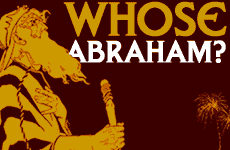 Iran’s Attack on Israel
Iran’s Attack on Israel


4 min read
An interfaith superstar?
With the Biblical Abraham's life about to be collectively recounted in coming weekly Torah readings at synagogues around the world, Avraham Avinu ("our father Abraham," as traditional Jews refer to him) has become the subject of a major newsweekly's cover story and two books.
Time Magazine's spin on the first forefather of the Jewish people, in its September 30 issue, was that he "is beloved by Jews, Christians and Muslims."
"Can this bond," the article's subheader asks, "stop them from hating one another?"
Jews, of course, don't hate either Christians or Muslims (though many of us do have rather understandable antagonism toward murderers and terrorists, whatever their religion). But what Time wishes to raise is the possibility that an investigation of Abraham might illuminate, perhaps even help resolve, the ongoing strife in the Middle East.
In that vein, David Van Biema, the main author of the article, "The Legacy of Abraham," begins on a hopeful note -- literally: an Arabic song, heard on a New York cabbie's radio, ostensibly pleading with Israel "We have the same father. Why do you treat us this way?"
Though a much more popular song in Arab lands is "I Hate Israel," and though the treatment of Israelis by some of their Arab neighbors and citizens has been considerably less than familial, any sentiment of brotherly love, however presented, is certainly worth celebrating.
And so Abraham, the writer continues, should by all logic be "an interfaith superstar," a figure whose importance to Judaism, Christianity and Islam might be expected to unite all those who profess those faiths.
Instead, though, as Mr. Van Biema concedes, the reality is that Abraham's name has been invoked primarily to stake and promote particularistic claims -- claims to ethnic authenticity, to land, to truth itself.
While Judaism regards Abraham as the ancestor of the Jewish people and the recipient on their behalf of divine deed to the Holy Land, Roman Catholicism includes his name in its Mass, and Islam considers him the first Muslim (who was commanded to sacrifice not Isaac but rather Ishmael, in whom Arabs see their progenitor). An Islamic religious leader is quoted in Time as characterizing Jewish Biblical claims to the Holy Land as "pure lies."
Bruce Feiler, the best-selling author of "Walking the Bible," has weighed in on the topic as well, with "Abraham: A Journey to the Heart of Three Faiths" (David Klinghoffer's "The Discovery of God: Abraham and the Birth of Monotheism" is due out in several months).
Following Time's politically correct lead, Mr. Feiler equates the claims of various faiths to Abraham, and asserts that each faith "performed reconstructive surgery" on its traditions in order to bolster its particular narrative of the forefather.
Now, we Jews are enjoined by our religious heritage not to missionize, and to avoid disputations with members of other faiths. At the same time, though, it is important that we reiterate elements of our convictions to ourselves.
Abraham lived about 1500 years before the advent of Christianity, and more than two thousand before Mohammed was born.
Like a fact that should be evident to any careful reader of either the Time article or Mr. Feiler's book, but whose import is somehow glossed over by both.
Abraham lived approximately 3800 years ago. In other words, about 1500 years before the advent of Christianity, and more than two thousand before Mohammed was born.
Thus, the Jewish "version" of Abraham -- in which he is told by God that, through his son Isaac, he would father a people who will be chosen to receive His law and inherit the Holy Land -- was the only one existent for many tens of hundreds of years, during which time, it was carefully and lovingly transmitted from Jewish generation to Jewish generation, unchanged and uncontested, before different versions of his life and mission eventually came to be offered by others.
And so, in the midst of all the Abrahamania, we might do well to dwell a bit more than usual on that fact - and on our forefather, by paying particularly close attention to the weekly Torah portions of Lech Lecha, Vayeira and Chayei Sara, which teach us about Avraham Avinu, and by studying traditional Jewish commentaries (like those translated into English and lucidly explicated in the ArtScroll/Mesorah Chumash) on those portions.
We don't know if, when the Christian and Islamic versions of Abraham appeared, our ancestors were flattered or disturbed by the developments. What we do know, though, is that they simply continued, with determination if without fanfare, to entrust their children with the tradition that their own ancestors had received and transmitted, received and transmitted, for thousands of years.
We Jews today should politely acknowledge with a smile all the contemporary discussion of Avraham Avinu, and proudly do precisely the same.
